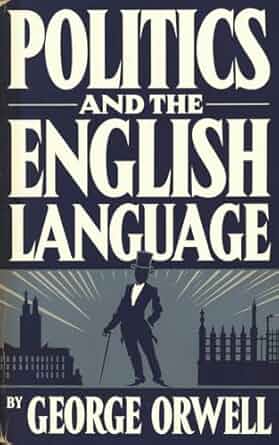Politics and the English Language

“Politics and the English Language” is not a book but an essay by George Orwell against bad English. Orwell’s rails against the usual suspects—wordiness, pretentious diction, cliche phrases1, meaningless words—but also some unusual ones—dying metaphors, verbal false limbs and some controversial ones: passive voice. The bad habits Orwell notes are all too common in academic writing.
These features of bad writing become an asset when writing about politics. When a totalitarian state decides to eliminate its internal critics as enemies of the revolution, its defenders can turn to academic, abstract language to cover up the brutal reality of elimination: bullets traveling through the heads of hundreds of thousands.
While freely conceding that the Soviet régime exhibits certain features which the humanitarian may be inclined to deplore, we must, I think, agree that a certain curtailment of the right to political opposition is an unavoidable concomitant of transitional periods, and that the rigours which the Russian people have been called upon to undergo have been amply justified in the sphere of concrete achievement.
When minority ethnic groups on the frontiers of new nations-states are forced off their land, the majority ethnic group can turn to euphemism.
transfer of population or rectification of frontiers
When an empire decides to bomb villages and round up civilians into concentration camps to crush a rebellion in a colony, the public relations officers can turn to a word of Latin origin that invokes peace.
pacification
It is this reason that Orwell rails so hard against bad English. It is dangerous. Good English matters it not simply because it makes for better literature or helps us communicate more clearly at work but because our freedoms depends on it. Good language, not just the English language, helps reveal truth. Bad language not only obfuscates the truth but attempts to disguise falsehoods as its opposite.
-
I am a fellow hater of cliches. Cliches are lazy. Using a cliche is communication by baggage. Rather than precisely arrange words to convey the desired meaning, you let the word choices of all the authors who have ever used the cliche determine the meaning. ↩